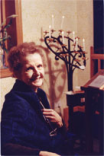
Lady Ryder of Warsaw, better known as Sue Ryder, looked fragile but possessed great dynamism, remarkable determination and deep reserves of compassion.
Sue was born in July 1924. War broke out in 1939. At first Sue worked in a local hospital near her home. In 1940 she saw the first of the war casualties. In June 1940 she joined the First Aid Nursing Yeomanry as a volunteer. After training she was sent to Special Operations Executive [SOE] headquarters in Baker Street, London. She was posted first to the Czech Section and then to the Polish section. This section dealt with the Polish resistance and trained agents to enter Poland, collect intelligence and sabotage the German war effort. Sue met and worked with these men and women. She learned of their lives abroad, their suffering and their treatment when captured, tortured and executed. She was posted abroad with her section and served in North Africa and then Italy. She saw the inside of some concentration camps and was privy to detailed reports of many others. It made an indelible impression upon her. In 1942, Sue volunteered to do relief work in Poland when she could be released from SOE duties.
The war ended on 8th May 1945. Sue was 22 years old. She had learned what dehumanisation was like. She was released from SOE and began relief work. At first she worked in France. She drove lorries with supplies to France.
The chaos caused by the destruction of all services and communications left thousands of people with a total lack of purpose and some resorted to crime. Many thousands of Poles had been removed from their homes and left stranded far far from their home country. Some resorted to crime to survive. When caught, they were imprisoned for years. Sue began prison visiting when in France. She saw that many of the Poles imprisoned came from concentration camps. There was No one else to visit them.
In the early 1950s the Red Cross wound down their work in Europe. Sue continued her relief work and prison visiting. She started a holiday scheme for those who were still living in relief camps. At Celle, in Germany, she founded a home for men who had been in prison. Volunteers came from 16 countries to build eight cottages for them. The home was such a success that she decided to expand the project and to add other sanctuaries for the disabled and the sick of all ages.
In 1951/2 Sue returned home on leave. She decided to form a small committee to perform similar work helping the disabled in England. So began the Sue Ryder Foundation. A year later, with her mother's permission, she turned her mother's house at Cavendish, Suffolk, into a home for handicapped people from all over Britain. With the help of volunteers Cavendish was enlarged into a registered home for 41 patients. Sue’s fame spread. In 1956 she was the subject of This is your Life on Television. Over the following years, more homes were opened, not only in England but in Germany, Poland, Yugoslavia and Greece. In time there were more than 80, supported by a network of almost 500 charity shops across Britain and the Continent.
Group Captain Geoffrey Leonard Cheshire, DSO, DFC was awarded the Victoria Cross in May 1944. He had completed over 100 missions as a bomber pilot and had a reputation second to none Bomber command. After the war, he lived a large empty Victorian house near Liss in Hampshire that he had been left by an aunt. One day, he was telephoned by the Matron at the local hospital and asked him to take in a former airman dying of cancer and blocking a bed at the hospital. He agreed. He found there were many others in a similar plight and thus the first home to bear his name was started.
In 1955 Leonard Cheshire invited Sue Ryder to visit his new home for the disabled at Ampthill. Neither of them know of the other’s work. Each told the other of their work. They became friends. In time they became engaged and, on 5 April 1959, they were married whilst in Bombay.
Sue Ryder was appointed OBE in 1957 and CMG in 1976.
In 1975, she and her husband received the International Variety Club's Humanitarian Award, an honour previously won by Dr Albert Schweitzer, the missionary, and Sir Winston Churchill.
In 1978, Sue Ryder was elevated to the Peerage. She realised that the House of Lords could provide her with a useful platform. She took the title Baroness Ryder of Warsaw because, she explained, of her "great admiration, respect and love for the Polish people. I feel I belong to Poland."
In the House of Lords, Lady Ryder spoke regularly in debates on housing, the needs of the sick and disabled, unemployment, drug abuse, race relations and defence. She continued to work indefatigably for her foundation, routinely travelling 50,000 miles a year to visit homes and new sites and to attend official functions. When Poland first began to break free of Communism in the early Eighties, she organised the consignment of weekly lorry loads of aid.
Her husband, Lord Cheshire, died in 1992. She died in 2000 and is survived by their son and daughter - both of whom, like their parents, are involved in charitable work.
Lady Ryder formed a new Charity, the Sue Ryder Prayer Fellowship, which acquired Parmoor for use as a retreat house in 1996. The garden is in the House’s grounds.
Details taken from Child of my Love, her autobiography published in 1986.

